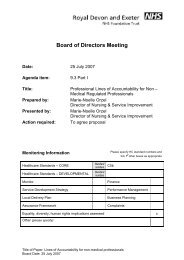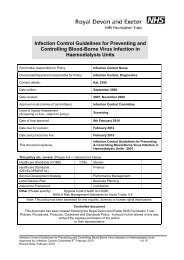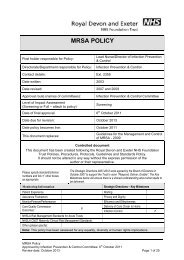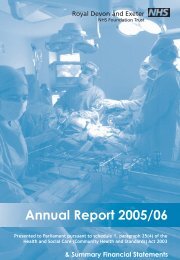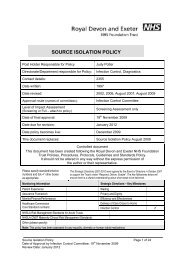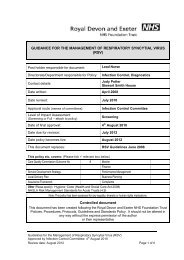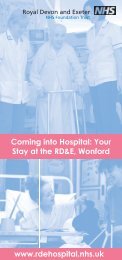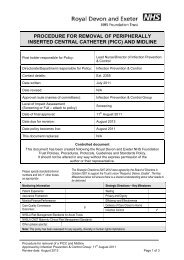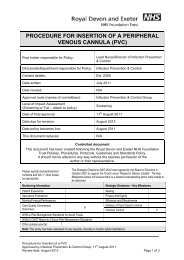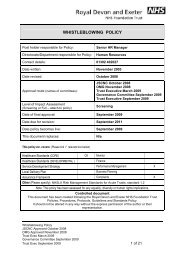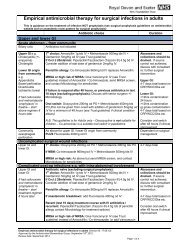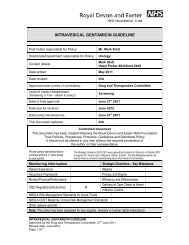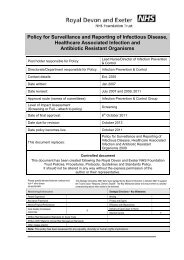Annual Report and Accounts 2012/13 - Royal Devon & Exeter Hospital
Annual Report and Accounts 2012/13 - Royal Devon & Exeter Hospital
Annual Report and Accounts 2012/13 - Royal Devon & Exeter Hospital
You also want an ePaper? Increase the reach of your titles
YUMPU automatically turns print PDFs into web optimized ePapers that Google loves.
16 2. Progress on our<br />
<strong>2012</strong>/<strong>13</strong> Priorities<br />
<strong>Royal</strong> <strong>Devon</strong> <strong>and</strong> <strong>Exeter</strong> NHS Foundation Trust<br />
Quality <strong>Report</strong> <strong>2012</strong>/<strong>13</strong><br />
Trust Priorities <strong>2012</strong>/<strong>13</strong><br />
Develop a strong<br />
value-based vision<br />
for Nurses, Midwives<br />
<strong>and</strong> Allied Health<br />
Professionals<br />
Over the course of the last year<br />
we have developed a new vision<br />
to guide the work of the 2,800<br />
nurses, midwives <strong>and</strong> allied health<br />
professionals (AHPs) providing<br />
patient care at the Trust. The<br />
programme set out an ambitious<br />
organisational-wide commitment to<br />
ensure that high st<strong>and</strong>ards of care are<br />
applied consistently. The three year<br />
programme, which was developed by<br />
senior leaders, seeks to capture the<br />
pride <strong>and</strong> dedication that our nurses,<br />
midwives <strong>and</strong> AHPs demonstrate on<br />
a daily basis. It also emphasises their<br />
passion to constantly improve patient<br />
care: ‘good’ is not good enough – we<br />
want to be the best we can possibly<br />
be for our patients, their families <strong>and</strong><br />
carers. Representatives of nurses,<br />
midwives <strong>and</strong> allied health professionals<br />
at the RD&E were involved in the<br />
development of the vision to reinforce<br />
their commitment to:<br />
• Providing safe, dignified <strong>and</strong><br />
compassionate care<br />
• Being open <strong>and</strong> honest in their<br />
communication <strong>and</strong> work in<br />
partnership with patients <strong>and</strong> their<br />
families<br />
• Recognising specific needs<br />
of individuals <strong>and</strong> providing<br />
personalised care.<br />
The programme of work which sits<br />
beneath the vision includes simple<br />
innovations such as ensuring good<br />
practice in one area can be rolled out<br />
<strong>and</strong> applied consistently <strong>and</strong> reliably<br />
across the hospital, <strong>and</strong> making sure<br />
that individuals are held accountable.<br />
For example:<br />
• We are rolling out Comfort<br />
Rounds where we ensure that<br />
each ward undertakes a nursing<br />
round every hour. We believe<br />
it is not acceptable for patients<br />
to rely on a call bell to request<br />
assistance. We want to pre-empt<br />
the essential needs of our patients;<br />
so every patient every hour will<br />
be asked by a nurse or midwife<br />
whether they are comfortable <strong>and</strong><br />
if there is anything they need.<br />
This regular check will address<br />
essential aspects of patient care<br />
including pain management,<br />
nutrition <strong>and</strong> hydration. We also<br />
expect this pro-active approach<br />
to reduce the incidence of patient<br />
falls <strong>and</strong> pressure ulcers. We have<br />
implemented Comfort Rounding<br />
on 15 wards <strong>and</strong> have a plan to<br />
see it fully implemented by July<br />
20<strong>13</strong><br />
• We have always sought to<br />
improve our services by listening<br />
to patient feedback. Now,<br />
based on a successful trial in<br />
our orthopaedic wards, we are<br />
systematically capturing patient<br />
feedback whilst patients are still in<br />
hospital <strong>and</strong> sharing this at daily<br />
team safety briefings to promptly<br />
address any issues or concerns<br />
that may arise. Our approach<br />
involves the distribution of yellow<br />
cards which simply ask patients<br />
“What went well” <strong>and</strong> “What<br />
would make it even better if …?”<br />
These are reviewed by the ward<br />
team at the end of the shift <strong>and</strong><br />
where possible any concerns are<br />
addressed immediately. Ward<br />
Matrons collate the responses<br />
to these questions <strong>and</strong> display<br />
publicly on the ward significant<br />
issues that have been identified<br />
<strong>and</strong> addressed. This has been<br />
implemented on 25 wards<br />
<strong>and</strong> departments <strong>and</strong> will be<br />
implemented across the Trust by<br />
June 20<strong>13</strong>. We will adopt this<br />
approach over the coming year in<br />
line with our Governors’ priorities.<br />
‘Good’ is not good<br />
enough – we want to<br />
be the best we can<br />
possibly be for our<br />
patients, their families<br />
<strong>and</strong> carers.



